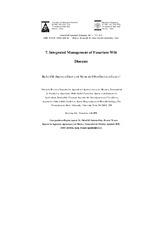Integrated Management of Fusarium Wilt Diseases
Autor
Jiménez Díaz, Rafael M.
Jiménez-Gasco, María del Mar
Editor
Transworld Research NetworkFecha
2011Materia
Integrated disease managementIDM
Fusarium
Soil-borne pathogens
METS:
Mostrar el registro METSPREMIS:
Mostrar el registro PREMISMetadatos
Mostrar el registro completo del ítemResumen
The integrated management concept is one of the fundamental paradigms that have emerged in crop protection in the last 50 yrs and yet a matter for legislation as exemplified by the European Union that recently has establishes the integrated management as the fundamental procedure for the management of crop diseases, pests and weeds. However, the integrated management is not a panacea for the control of plant diseases. It is an ecology-based approach aiming minimizing damage caused by diseases through ‘the combined use of all available disease control measures, either simultaneously or in a sequence, through actions taken prior and after establishing the crop’. In this chapter, we propose and develop a strategy for the integrated management for Fusarium wilts, one of the most devastating and challenging type of diseases impairing agricultural production worldwide,, based on the: (i) use of pathogen-free planting material; (ii) site selection to avoid planting into high risk soils; (iii) reduction or elimination of F. oxysporum inoculum in soil; (iv) use of biocontrol agents for protection of healthy planting material from infection by resident or incoming inoculum subsequent to planting; (v) use of resistant cultivars regardless the level of resistance; and (vi) choice of cropping practices to avoid conditions favouring infection of the plant. The integrated management of Fusarium wilt diseases is difficult because complexities of target pathosystems are overlaid on the inherent complexities of the management strategy itself. Much research is still needed on population biology and genetic diversity in Fusarium wilt pathogens, disease risk prediction, disease-incidence-yield losses relationships, biological control, biotechnological breeding for disease resistance. On top of difficulties pointed out above, the practice of integrated management requires involvement of well-trained professional plant pathologists able to implement the tenets of the concept at the local level, as well as to incorporate into decision-making framework new knowledge and technologies that may be developed from scientific research. As the demand has increased for knowledgeable practitioners capable of integrating multifaceted controls in rigorous IDM programs, institutional support has declined through declining or even vanishing University education in Plant Pathology and the loss of extension-related activities in commercial agriculture. Erosion at the top of the trickle-down structure responsible for knowledge transfer to the field is one of the most serious threats to IDM.

